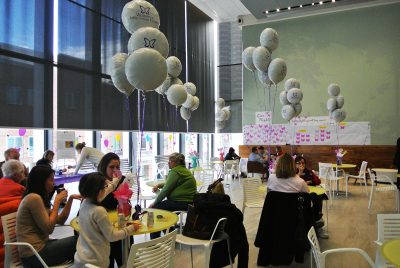
Ten years ago, with an increase in the number of women being affected by lung cancer, organizers at the Women’s Lung Cancer Program took matters into their own hands.
Alongside Brigham and Women’s Hospital and with the support of cancer survivors, they set out on a venture to spread awareness, remove the stigma associated with lung cancer patients and empower women faced with this diagnosis.
On Saturday, the Women’s Lung Cancer Program organized a balloon-selling fundraiser, where patients, family and friends offered donations, shared personal stories and took part in a silent auction. The $25,000 already raised will be divided between three areas of development, said Meg Kruithoff, the event organizer.
“The balloon-a-thon event on Saturday was the culminating celebration of the Women’s Lung Cancer Program’s fundraising campaign, which raised more than $25,000 to support patient programming, advocacy work and research for women’s lung cancer at Brigham and Women’s Hospital,” Kruithoff said after the fundraiser.
The first area of development holds the purpose of spreading an educational series that teaches and informs women about this menacing illness. The second area, named “Pillow Program,” enables the distribution of cough pillows to patients recovering from surgery and the third regards the funding of research behind sex differences and its correlation with therapeutic success.
These investigations have been undertaken by leading cardiothoracic surgeon and Yolonda Colson, the director of the Women’s Lung Cancer Program.
Each event, as Colson put it, served as a way to “gather women and celebrate survivorship and understand the importance of knowledge and awareness.”
Colson said she was driven to pursue further investigation based on the scientific hypothesis of a different impact of lung disease on women’s health.
This disease is the leading cause of cancer deaths for women and men, and accounts for a higher number of cancer deaths in women than breast, ovarian and uterine cancers combined, according to Brigham and Women’s Hospital’s website. Medical experts have looked at trends over the years and determined that in the coming year, 400,000 Americans would live with lung cancer and more than 158,000 of these cases will be fatal, of which nearly half are women. These numbers are due to the differences in risk, susceptibility, lung cancer biology and response to therapy.
“The women of the Women’s Lung Cancer Forum — lung cancer survivors and their family members — can be very proud of their fundraising efforts and rest assured that many women and men will benefit from future research, as well as educational initiatives of the Women’s Lung Program,” Kruithoff said.
The strong association between smoking and lung cancer has shed a negative stigma on this severe condition. Yet, one in every five women with lung cancer has never smoked.
The risk factors and poor prognosis of lung cancer explain its historical disregard. However, its increasing health burden has led to a renewed interest.
Women’s higher susceptibility is due to different types of lung cancer such as increases in incidence of adenocarcinoma and its subtype, bronco alveolar. The adenocarcinoma and bronco alveolar subtype are very common and found in 50 to 93 percent of non-smokers with lung cancer.
Additionally, women appear to have a better response to standard chemotherapy and are also able to receive targeted therapies such as epidermal growth factor receptor, to which women had an 82 percent response.
Experts such as Colson continue the search for less aggressive therapy, as well as improved support for these struggling women. Their success was illustrated in survivor stories, which warm the hearts of members of the Forum and show the optimistic outcomes of perseverance.
One particularly touching story was presented at the balloon-a-thon fundraiser. Lena Bonanno, a patient of Colson, was diagnosed with inoperable lung cancer around six years ago. Before being taken into the able hands of Colson, she had lost six of her friends and one co-worker to the illness and was under the impression that “nothingness awaited” her.
“Dr. Yolonda L. Colson gave me more time with my husband, children and grandchildren and I am grateful for that and for the Forum,” Bonanno said.
For the women in the Women’s Lung Cancer Program, the most important and “greatest aspect is to be able to share experiences, as the hardest thing about lung cancer is being alone,” Colson said.
“Having the ability to sit and talk about it makes a great change,” Bonanno said.











